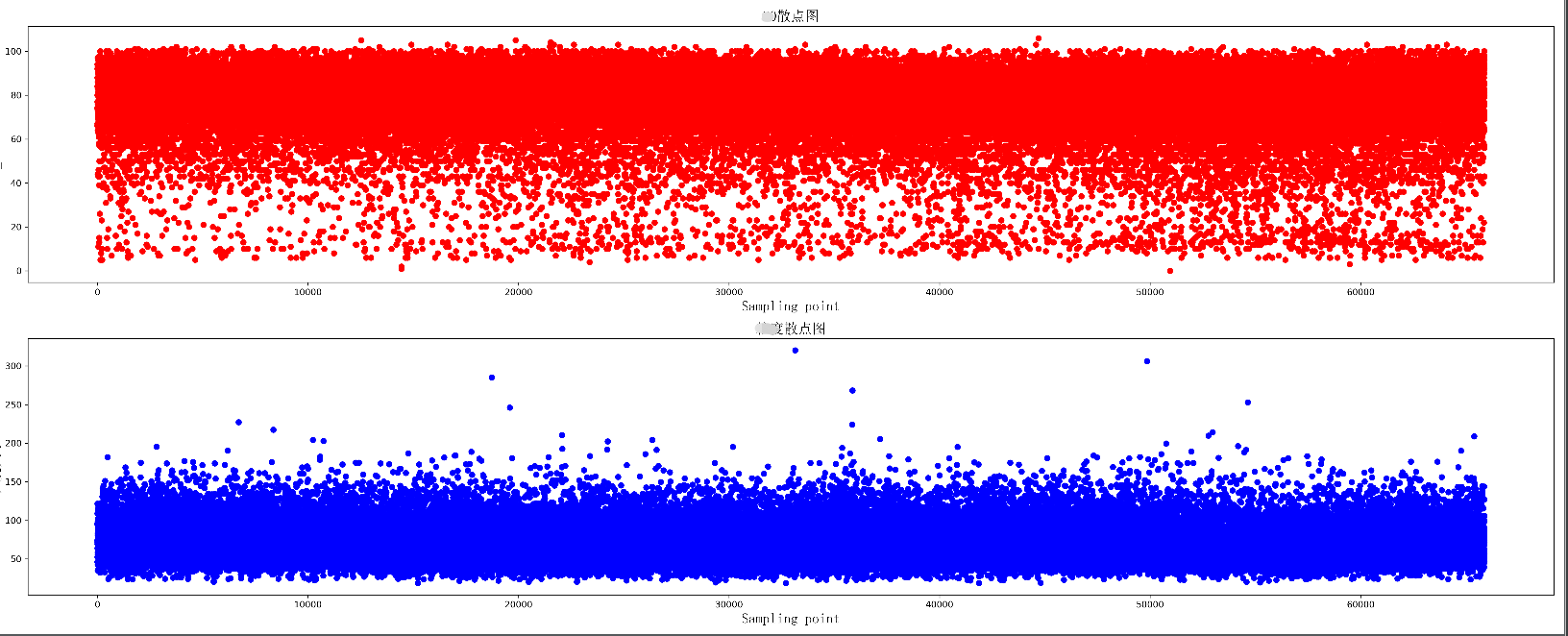Python_散点图与折线图绘制
在数据分析的过程中,经常需要将数据可视化,目前常使用的:散点图 折线图
需要import的外部包 一个是绘图 一个是字体导入
import matplotlib.pyplot as plt from matplotlib.font_manager import FontProperties
在数据处理前需要获取数据,从TXT XML csv excel 等文本中获取需要的数据,保存到list
1 def GetFeatureList(full_path_file): 2 file_name = full_path_file.split('\\')[-1][0:4] 3 # print(file_name) 4 # print(full_name) 5 K0_list = [] 6 Area_list = [] 7 all_lines = [] 8 f = open(full_path_file,'r') 9 all_lines = f.readlines() 10 lines_num = len(all_lines) 11 # 数据清洗 12 if lines_num > 5000: 13 for i in range(3,lines_num-1): 14 temp_k0 = int(all_lines[i].split('\t')[1]) 15 if temp_k0 == 0: 16 K0_list.append(ComputK0(all_lines[i])) 17 else: 18 K0_list.append(temp_k0) 19 Area_list.append(float(all_lines[i].split('\t')[15])) 20 # K0_Scatter(K0_list,Area_list,file_name) 21 else: 22 print('{} 该样本量少于5000'.format(file_name)) 23 return K0_list, Area_list,file_name
绘制两组数据的散点图,同时绘制两个散点图,上下分布在同一个图片中
1 def K0_Scatter(K0_list, area_list, pic_name): 2 plt.figure(figsize=(25, 10), dpi=300) 3 # 导入中文字体,及字体大小 4 zhfont = FontProperties(fname='C:/Windows/Fonts/simsun.ttc', size=16) 5 ax = plt.subplot(211) 6 # print(K0_list) 7 ax.scatter(range(len(K0_list)), K0_list, c='r', marker='o') 8 plt.title(u'散点图', fontproperties=zhfont) 9 plt.xlabel('Sampling point', fontproperties=zhfont) 11 plt.ylabel('K0_value', fontproperties=zhfont) 12 ax = plt.subplot(212) 13 ax.scatter(range(len(area_list)), area_list, c='b', marker='o') 14 plt.xlabel('Sampling point', fontproperties=zhfont) 15 plt.ylabel(u'大小', fontproperties=zhfont) 16 plt.title(u'散点图', fontproperties=zhfont) 17 # imgname = 'E:\\' + pic_name + '.png' 18 # plt.savefig(imgname, bbox_inches = 'tight') 19 plt.show()
散点图显示

绘制一个折线图 每个数据增加标签
1 def K0_Plot(X_label, Y_label, pic_name): 2 plt.figure(figsize=(25, 10), dpi=300) 3 # 导入中文字体,及字体大小 4 zhfont = FontProperties(fname='C:/Windows/Fonts/simsun.ttc', size=16) 5 ax = plt.subplot(111) 6 # print(K0_list) 7 ax.plot(X_label, Y_label, c='r', marker='o') 8 plt.title(pic_name, fontproperties=zhfont) 9 plt.xlabel('coal_name', fontproperties=zhfont) 10 plt.ylabel(pic_name, fontproperties=zhfont) 11 # ax.xaxis.grid(True, which='major') 12 ax.yaxis.grid(True, which='major') 13 for a, b in zip(X_label, Y_label): 14 str_label = a + str(b) + '%' 15 plt.text(a, b, str_label, ha='center', va='bottom', fontsize=10) 16 imgname = 'E:\\' + pic_name + '.png' 17 plt.savefig(imgname, bbox_inches = 'tight') 18 # plt.show()

绘制多条折线图
1 def K0_MultPlot(dis_name, dis_lsit, pic_name): 2 plt.figure(figsize=(80, 10), dpi=300) 3 # 导入中文字体,及字体大小 4 zhfont = FontProperties(fname='C:/Windows/Fonts/simsun.ttc', size=16) 5 ax = plt.subplot(111) 6 X_label = range(len(dis_lsit[1])) 7 p1 = ax.plot(X_label, dis_lsit[1], c='r', marker='o',label='Euclidean Distance') 8 p2 = ax.plot(X_label, dis_lsit[2], c='b', marker='o',label='Manhattan Distance') 9 p3 = ax.plot(X_label, dis_lsit[4], c='y', marker='o',label='Chebyshev Distance') 10 p4 = ax.plot(X_label, dis_lsit[5], c='g', marker='o',label='weighted Minkowski Distance') 11 plt.legend() 12 plt.title(pic_name, fontproperties=zhfont) 13 plt.xlabel('coal_name', fontproperties=zhfont) 14 plt.ylabel(pic_name, fontproperties=zhfont) 15 # ax.xaxis.grid(True, which='major') 16 ax.yaxis.grid(True, which='major') 17 for a, b,c in zip(X_label, dis_lsit[5],dis_name): 18 str_label = c + '_'+ str(b) 19 plt.text(a, b, str_label, ha='center', va='bottom', fontsize=5) 20 imgname = 'E:\\' + pic_name + '.png' 21 plt.savefig(imgname,bbox_inches = 'tight') 22 # plt.show()

图形显示还有许多小技巧,使得可视化效果更好,比如坐标轴刻度的定制,网格化等,后续进行整理
posted on 2019-10-22 14:44 wangxiaobei2019 阅读(3594) 评论(0) 编辑 收藏 举报






【推荐】国内首个AI IDE,深度理解中文开发场景,立即下载体验Trae
【推荐】编程新体验,更懂你的AI,立即体验豆包MarsCode编程助手
【推荐】抖音旗下AI助手豆包,你的智能百科全书,全免费不限次数
【推荐】轻量又高性能的 SSH 工具 IShell:AI 加持,快人一步
· 10年+ .NET Coder 心语,封装的思维:从隐藏、稳定开始理解其本质意义
· .NET Core 中如何实现缓存的预热?
· 从 HTTP 原因短语缺失研究 HTTP/2 和 HTTP/3 的设计差异
· AI与.NET技术实操系列:向量存储与相似性搜索在 .NET 中的实现
· 基于Microsoft.Extensions.AI核心库实现RAG应用
· 10年+ .NET Coder 心语 ── 封装的思维:从隐藏、稳定开始理解其本质意义
· 地球OL攻略 —— 某应届生求职总结
· 提示词工程——AI应用必不可少的技术
· 字符编码:从基础到乱码解决
· SpringCloud带你走进微服务的世界